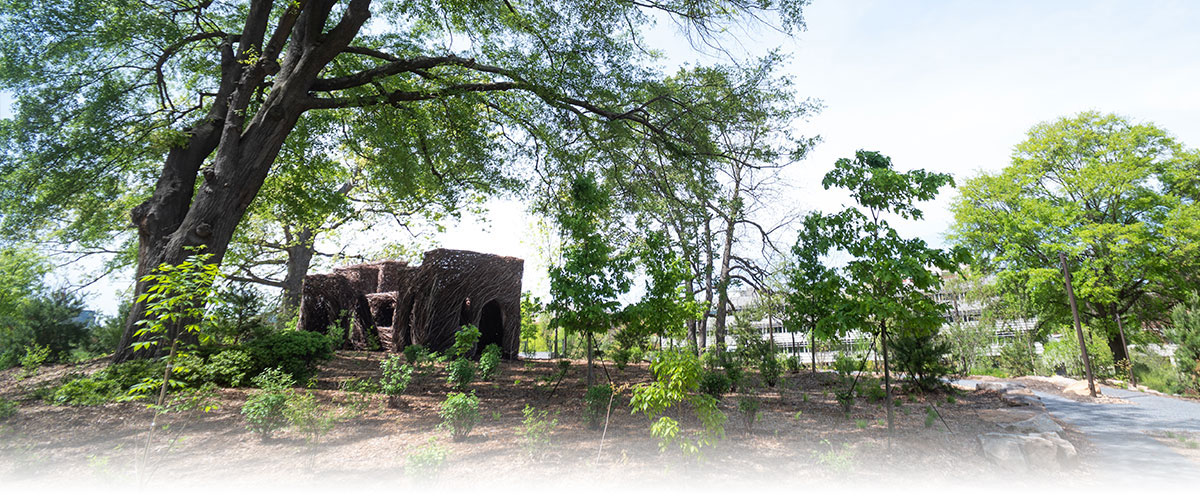In this year of uncertainty and unforeseen challenges, our campus life departments defied the odds and continued to provide engaging and supportive programs and services to our students both on and off campus. In doing so, they exemplified many of Georgia Tech’s values, always keeping students a top priority.
From the establishment of an emergency fund to creative and innovative use of technology to maintain connections and support systems for students all over the world, Campus Services and Student Life staff collaborated to find innovative ways to nurture the well-being of our community both in-person and virtually.
These teams will continue to support and celebrate our students. By demonstrating excellence in our diverse programs and services, they will strive to exceed our students’ needs and expectations while enriching their academic experience at Georgia Tech.
Kelly Fox
Executive Vice President for Administration and Finance
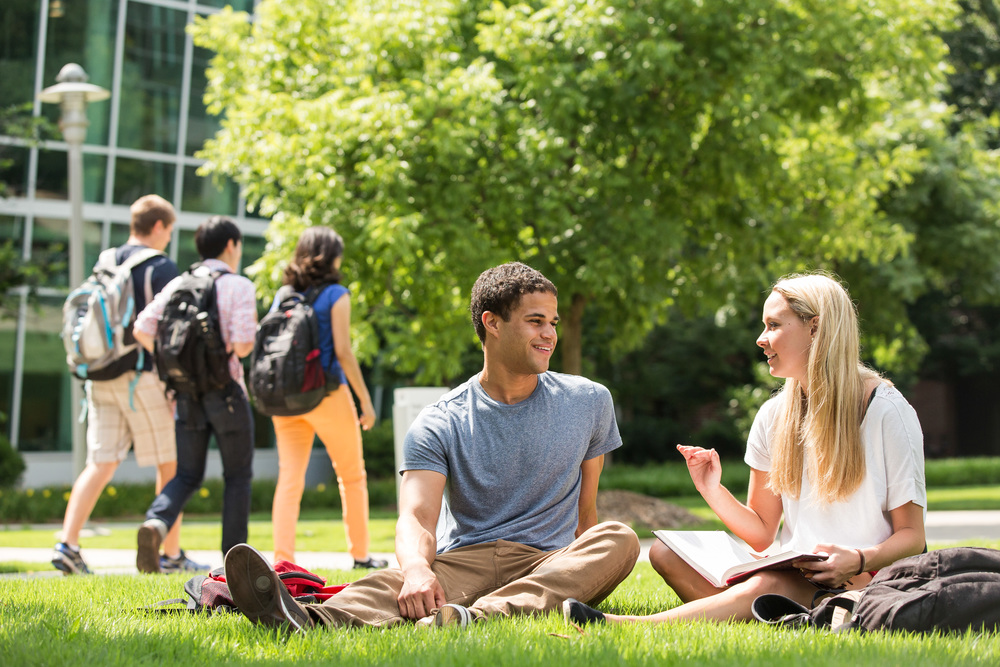
Leadership Reorganization Addresses Student Well-Being
Georgia Tech recently restructured its Student Life and Campus Services into an integrated, focused organization composed of a wide array of nonacademic student services: Student Engagement and Well-Being.
After a nationwide search, Luoluo Hong was selected as the inaugural vice president of the newly created division and began her new role Aug.1, 2021. Under Hong’s leadership, Student Engagement and Well-Being will combine the former divisions of Student Life and Campus Services.
By bringing together key nonacademic aspects, the Institute will be better positioned to enhance the student experience, promote a culture of well-being, and advance student equity initiatives. Ideally, the new reporting structure will help foster a shared vision of creating a holistic and progressive approach to student development and engagement in support of the Institute’s new strategic plan.
For students, our administrative reporting structures are not visible. What matters is that we demonstrate a consistent commitment to care and compassion, and are rigorously dedicated to responding to their needs, challenging them to reach their full potential, and supporting their learning. I am really looking forward to collaborating closely with students, faculty, and staff to improve health outcomes, maximize student success, and close equity gaps.
-Luoluo Hong, Vice President for Student Engagement and Well-Being
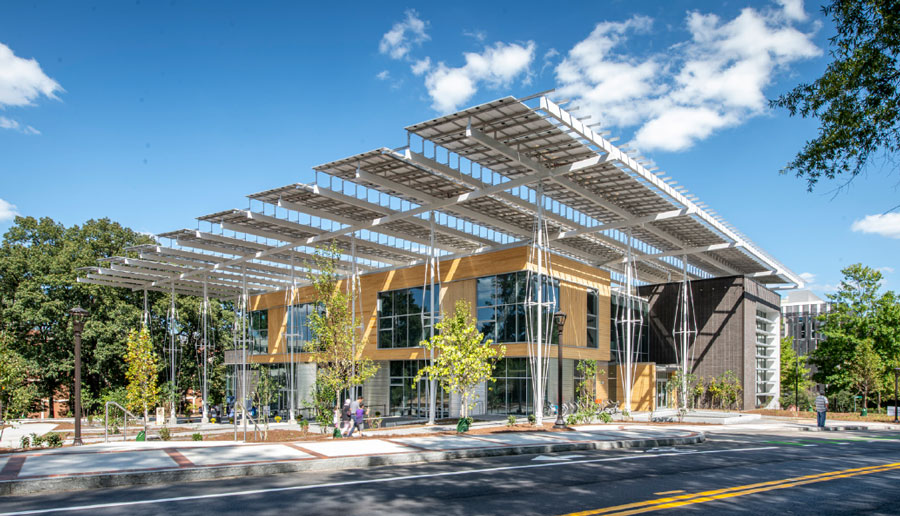
Trifecta of Treasures Reflect Restoration, Remembrance, Conservation
Spring 2021 welcomed the official opening and certification of the campus projects, made possible by several departments in Administration and Finance, that truly demonstrate how Georgia Tech is leading and inspiring by example — by becoming a model of efficiency, sustainability, ethics, equity, and inclusion.
At the corner of Hemphill Avenue and Ferst Drive now sits a lush, green, 8-acre treasure. Known as the EcoCommons, the space represents a portion of 80 acres of greenspace throughout Georgia Tech’s campus that follow the original naturally occurring stream paths of this region before urbanization. Designed with increased biodiversity, living learning laboratories, and spaces to recharge and reflect, these revitalized greenspaces are engineered to give back to the environment and the community.
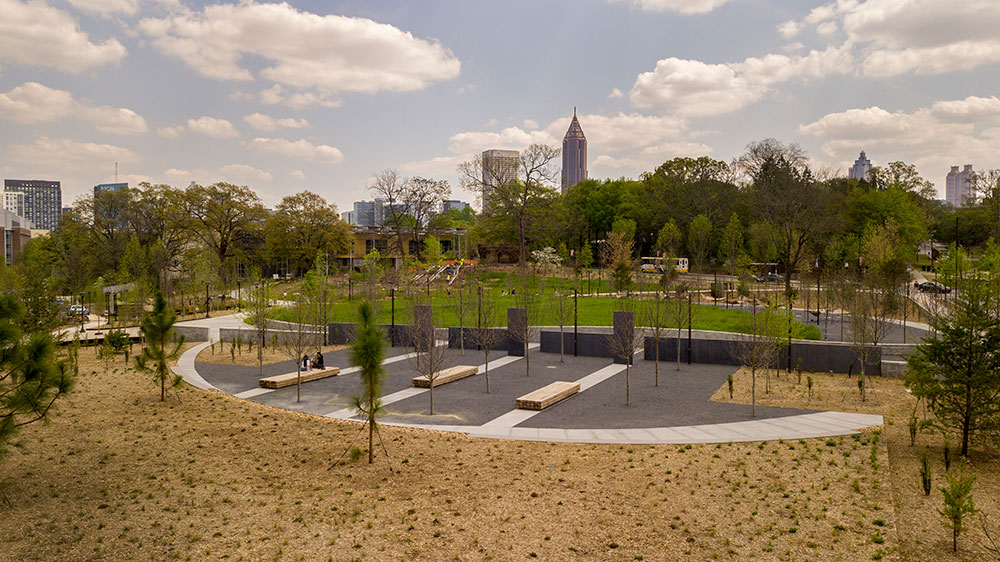
A landscape view of the EcoCommons.
The ecological importance of the EcoCommons shares the spotlight with the historical importance of the space. Unity Plaza, which sits on the site of the former Pickrick Restaurant, honors the civil rights significance of the past and encourages healing and understanding — while also inspiring aspirations of a healthier future for society and the environment.
Anchoring the eastern side of the EcoCommons is The Kendeda Building for Innovative Sustainable Design. Earlier this year, The Kendeda Building became the first building of its size and scale in the Southeast to earn the ambitious Living Building Challenge certification and is a true testament to how Georgia Tech is rethinking its built environment. The Kendeda Building also gives back more than it takes from the environment and serves as a model for new construction and operations on campus. It is an inspiration for leading by example by continuing to make the Georgia Tech campus more sustainable and teaching students to develop sustainability and equity solutions, and to find global solutions through inquiry and research.
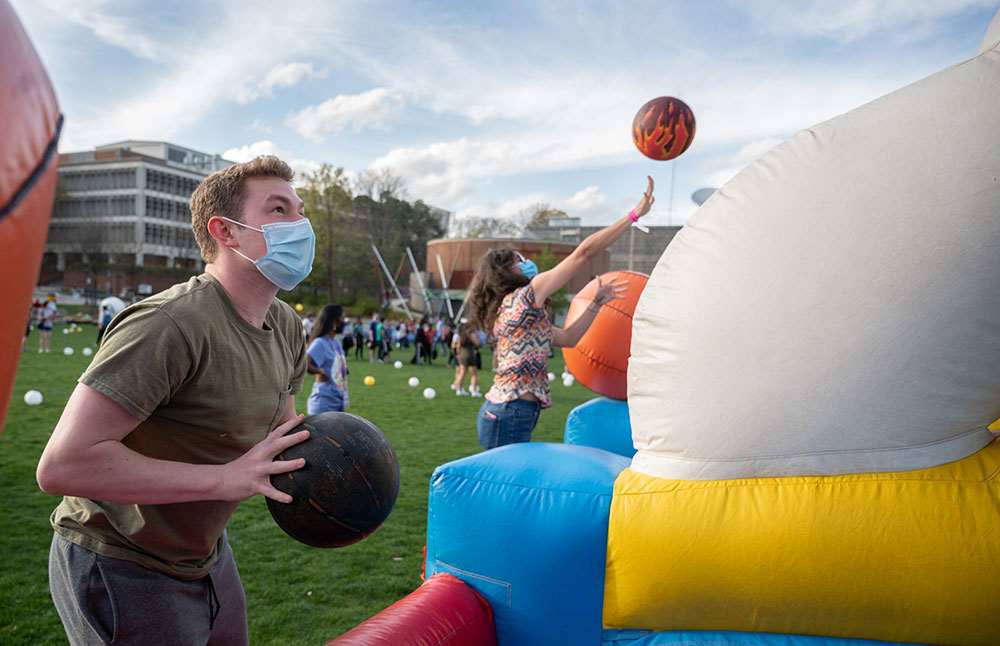
Continuing Campus Life
Throughout the pandemic, even though the Institute could not engage students in the same traditional ways, many student-facing programs, services, and organizations continued to support student involvement, leadership, well-being, and success through a hybrid approach to program and service delivery. In fact, many campus life departments and organizations used this opportunity to be inventive while still supporting their missions, and found the ability to connect with much larger audiences — even across the globe — in some cases.
- Over 2,000 students logged in from 31 different countries for the 2020 virtual Homecoming concert.
- The 2020 Mr. & Ms. Georgia Tech competition turned into a weeklong celebration with both in-person and virtual events, culminating with a virtual announcement of the winners.
- Midnight Breakfast attracted more than 1,000 students. They picked up their food to-go instead of gathering in the Student Center, but this model allowed more students than ever to participate!
- Alternative Service Breaks made significant programmatic changes in 2020 and, instead of traveling to support communities in need, held three virtual programs incorporating social issue education, reflection, and virtual community engagement for 67 student participants.
- MOVE’s 10th annual Into the Streets Day of Service in Fall 2020 featured a “DIY” format to provide an in-person service experience while accommodating for social distancing. MOVE student leaders created service kits in two themes – dog and cat toy-making or campus clean-up. Each kit contained instructions and materials necessary to complete the projects. Students picked up their kit at a designated time and could finish their project independently.
- Greeks United for Inclusivity, Diversity, and Equity (G.U.I.D.E) launched with 50 student leaders participating in conversations around inclusion and equity.
- The Student Government Association (SGA) supported the establishment of McCamish Pavilion as a Fulton County early voting site and launched a PPE distribution program at the start of the school year to equip students with masks and sanitizer.

Ivan Allen College Announces New Executive Leadership Team

The Ivan Allen College of Liberal Arts has reorganized its leadership team, naming three new associate deans to help the College efficiently, effectively, and equitably accomplish its goals and priorities.
Dean Kaye Husbands Fealing named Aaron Levine, associate professor in the School of Public Policy, as assocate dean for Research and Outreach. He will advise the dean, the College’s executive leadership team, and school chairs on matters related to sponsored, foundation, outreach, and engagement activities and opportunities. Associate Professor Shatakshee Dhongde of the School of Economics will serve as associate dean for Academic Affairs. Dhongde will advise the dean on matters related to undergraduate and graduate academic programs and student initiatives in the College. Richard Utz was named associate dean for Faculty Development. Until his appointment, Utz had been chair of the School of Literature, Media, and Communication. As associate dean for Faculty Development, Utz advises the dean, the College’s executive leadership team, and school chairs on matters related to faculty affairs.
“The goal of the executive leadership team reorganization of responsibilities is to allow our College to align with our peer institutions and create a pathway for our continued success,” said Husbands Fealing. “I look forward to working with our new team to further refine and achieve the potential of the College.” The appointments were effective Aug. 1, 2021.
Air Force ROTC Hosts General Jeffrey Harrigian for Talk Focused on Diversity in Leadership
On Feb. 8, 2021, Georgia Tech’s Air Force Reserve Officer Training Corps (ROTC) Detachment 165 had the honor of hosting Gen. Jeffrey L. Harrigian. As the commander of U.S. Air Forces in Europe and Africa, a key player in Operation Desert Storm, and with more than 35 years of active-duty service in the Air Force, Harrigian had priceless experiences to share with Air Force, Army, and Navy students. The general’s visit was part of a tour to promote the Air Force’s Go Inspire program. His visit served as a reminder of the Air Force’s mission to improve the representation of leadership through accepting a diverse family of people and backgrounds.
“Increasing diversity and attracting the best talent across our Air and Space Forces is a war-fighting imperative for our nation, and, as such, general officer leadership is critical,” wrote Secretary of the Air Force Barbara Barrett in a memo announcing the program.
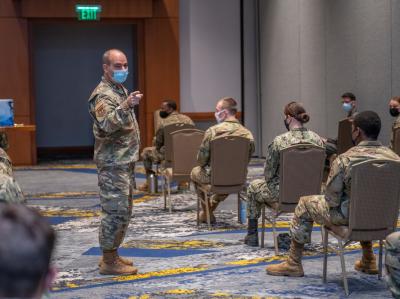
Georgia Tech Earns STARS Silver Rating for Its Contributions to Sustainability
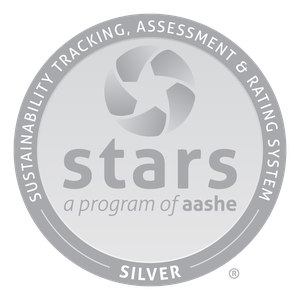
Georgia Tech recently achieved a STARS (Sustainability Tracking, Assessment, and Rating System) silver rating by the Association for the Advancement of Sustainability in Higher Education. Sustainability is a common theme throughout the strategic plan, which reinforces a shared commitment to being thoughtful stewards of our resources: social, environmental, and economic. It is one of many ways Georgia Tech leads by example in how we deliver on our educational, operational, and research mission.
Georgia Tech’s recent silver rating is the result of a 22-month effort, led by the Office of Campus Sustainability in partnership with Serve-Learn-Sustain, Infrastructure and Sustainability, and Institute Research Planning, to compile more than 1,300 unique information or data inputs about our sustainability-related actions. More than 150 people were engaged across 100 departments, demonstrating how sustainability is truly interwoven throughout Georgia Tech.
Georgia Tech Fares Well in Directors’ Cup Standings
Wrapping up its most successful all-around year in more than a decade, Georgia Tech Athletics earned a 44th-place finish in the 2020-21 Learfield IMG College Directors’ Cup standings.
The Directors’ Cup is the nation’s most-recognized all-sports ranking for college athletics, with points awarded based on teams’ finishes in the NCAA Championships.
Georgia Tech’s 44th-place finish is its best since it placed 31st in 2004-05 and its third-best finish since the Directors’ Cup’s inception in 1993-94. (Tech also placed 31st in 2003-04.)
Georgia Tech and Texas Tech were the only institutions among the top 50 in this year’s Directors’ Cup final standings that have 17 sports or less. (Texas Tech, which placed 43rd, also has 17 sports.)
The Yellow Jackets’ 44th-place finish comes on the heels of 11 of the Institute’s 17 teams earning points in the final standings in 2020-21, which represented the most Tech teams to earn points in a single year since 12 did so in 2009-10. The 44th-place finish is a remarkable turnaround for Georgia Tech under the watch of Athletics Director Todd Stansbury. Just three years ago (2017-18), Tech had only three teams that earned Directors’ Cup points and placed 121st in the final standings.

GT Athletics Wraps Up Athletics Initiative 2020

GT Athletics Wraps Up Athletics Initiative 2020
Despite the challenges presented by the Covid-19 pandemic over the final 10 months of the 36-month initiative, the $175.39 million that Georgia Tech benefactors donated to AI 2020 from Jan. 1, 2018, to Dec. 31, 2020, exceeded the $125 million goal by more than 40%.
AI 2020 surpassed its fundraising goals in all three of its areas of focus: facilities ($102.23 million raised against $88 million goal), endowments ($37.75 million raised against $25 million goal), and current operations ($37.41 million raised against $12 million goal).
Notable facilities projects already funded by AI 2020 included Georgia Tech football’s new $4.5 million locker room, the Yellow Jackets’ new women’s basketball locker room, and the $9 million Phase II renovation of the newly named Mac Nease Baseball Park, home of Tech baseball.
Tech donors also made gifts and commitments of $84.69 million toward a new Athletics Performance Center. The new Athletic Performance Center will provide enhanced personalized services to student-athletes including academic, wellness, and performance support, as well as programming to prepare students for professional careers. Design and construction would begin following approval from the Institute and USG.
Georgia Tech Diversity, Equity, and Inclusion Council Formed to Further Address Campus Disparity, Bias, and Inequity
More than 50 representatives from across campus were appointed by President Ángel Cabrera to the newly formed Georgia Tech Diversity, Equity, and Inclusion Council (GTDEIC).
GTDEIC will work to identify issues of campus racial and gender disparity, bias, and inequity to be addressed in order to deliver upon the Institute’s vision of diversity and inclusion. The members represent diverse voices and perspectives from staff, faculty, and students. It is chaired by Archie W. Ervin, vice president for Institute Diversity, Equity, and Inclusion. Pearl Alexander, executive director of Staff Diversity, Inclusion, and Engagement, serves as vice chair.
The GTDEIC will continually monitor and assess the Institute’s progress on achieving its goals for becoming a model campus community for diversity, equity, and inclusion, and develop evidenced, informed recommendations, which they will submit periodically to Cabrera and the Institute’s executive leadership team for consideration in developing strategic actions.
Since its initial meeting Nov. 30, 2020, the GTDEIC has launched three working groups composed of Council members and issue-area experts from across the campus: Diversity, Equity, and Inclusion Plan; Campus Climate Assessment; and Covid-19 Impacts on Faculty.
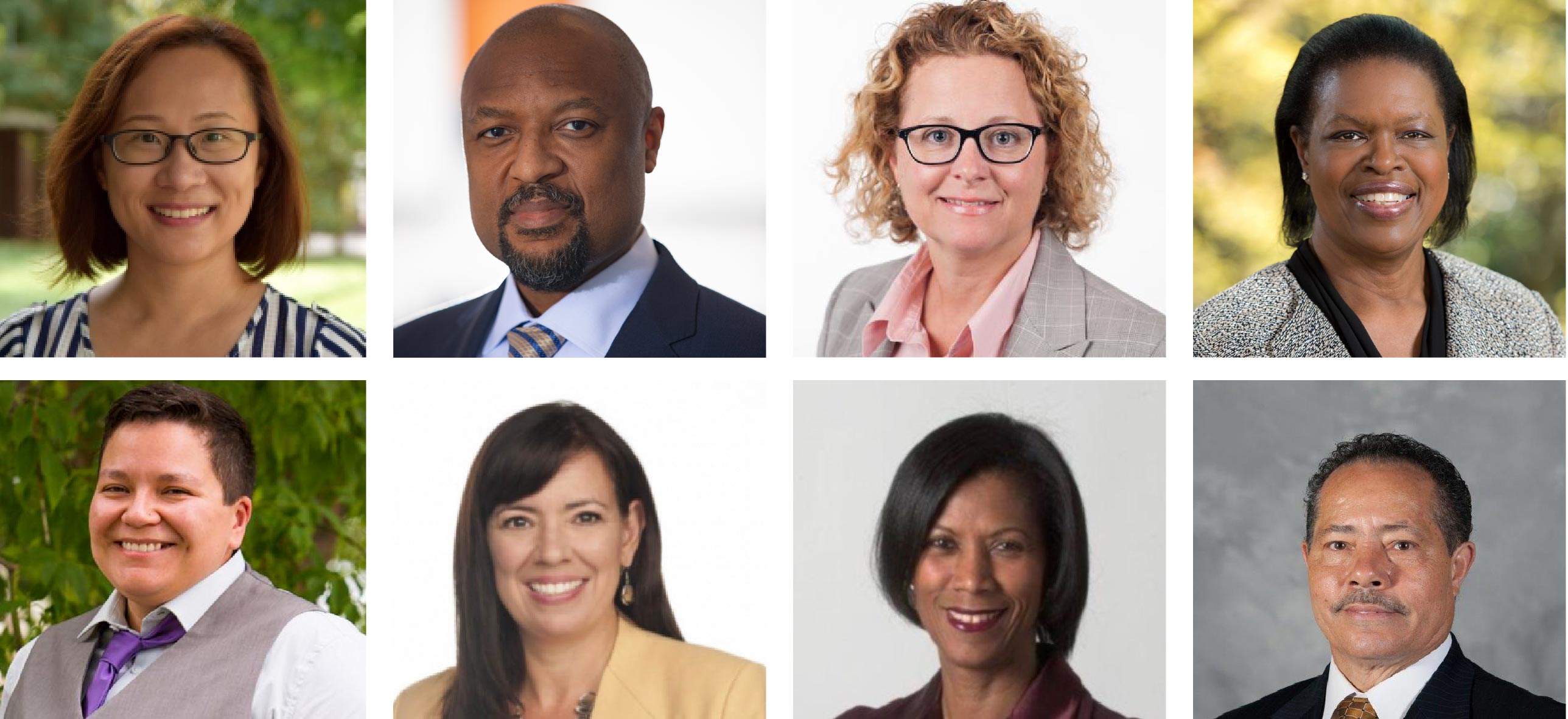
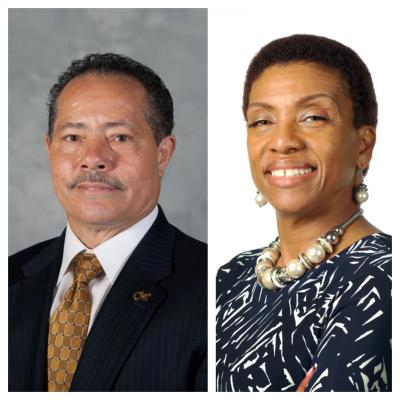
Broad-Based Asymptomatic Testing Program Helps Control Covid-19
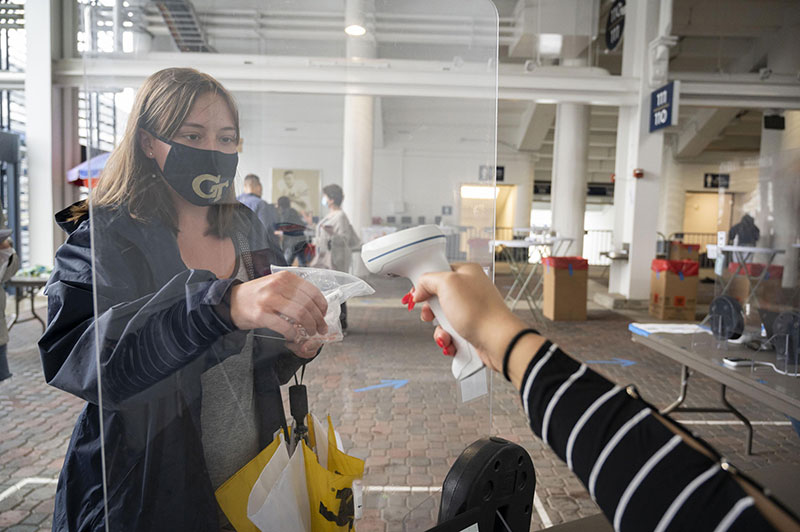
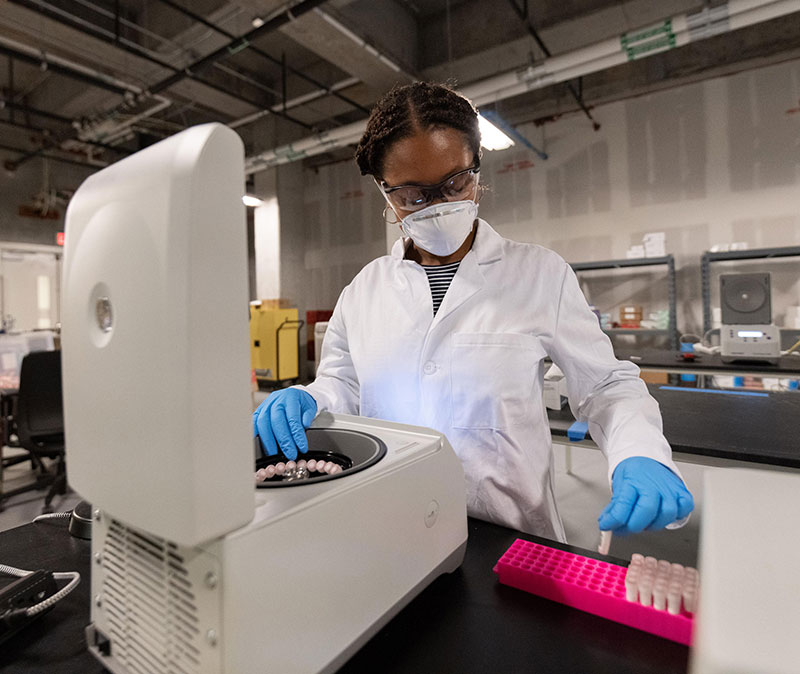
An ambitious campuswide testing program aimed at identifying asymptomatic Covid-19 community members has helped limit daily case counts at Georgia Tech to single digits, throughout a school year with thousands of students living on campus and still more students, faculty, and staff commuting to learn and work there each day.
“We’d like to test everybody on campus once a week because it’s very clear that asymptomatic and pre-symptomatic people are transmitting the virus,” explains Greg Gibson, Regents Professor and Tom and Marie Patton Chair in the School of Biological Sciences, who is a leader of the research team that developed the testing program. “The case decline is consistent with what we predicted — and is very encouraging, in many ways even better than we’d hoped.” Gibson also serves as director of the Center for Integrative Genomics and is a member of the Petit Institute for Bioengineering and Bioscience.
Regular testing takes place in multiple campus locations on a walk-up basis that is free of charge and takes just a few minutes. To reduce the number of polymerase chain reaction, or PCR, tests that must be run each day, the saliva samples are pooled so that a single test can examine samples from five individuals. An innovative dual pooling strategy can identify an individual in a set of samples who is presumed positive.
Data from testing has allowed campus scientists and contact tracers to identify developing clusters on campus, and focus mobile testing resources on those hot spots. Some 370,000 program test samples have been processed since August 2020.
Students Recognized as Student Sustainability Champions
A new student award at Georgia Tech is honoring the work of students who champion sustainable environmental policy and practices on campus and beyond.
The Student Sustainability Champion Award “amplifies impact through inspiration, action, and the achievement of sustainability goals” and was presented during Georgia Tech’s weeklong Earth Day 2021 celebration, which centered on the new Institute strategic plan and this year’s celebration theme: Amplify Impact.
Thiago Esslinger, a College of Sciences undergraduate who serves as president of Students Organizing for Sustainability, received the inaugural Student Sustainability Champion Award. Esslinger is also co-founder of two student environmental action groups on campus and helps lead the EcoReps sustainability ambassador program for resident advisors.
College of Engineering undergraduate Atticus Lemahieu received Honorable Mention. Lemahieu is co-president of the Association of Environmental Engineers and Scientists, works with Serve-Learn-Sustain, and helped create the Regional Center of Expertise Greater Atlanta Youth Network. He is also a member of the EcoReps program.
The award application is open to all Georgia Tech students who demonstrate sustainability leadership with a lasting impact on campus culture and institutional sustainability progress.
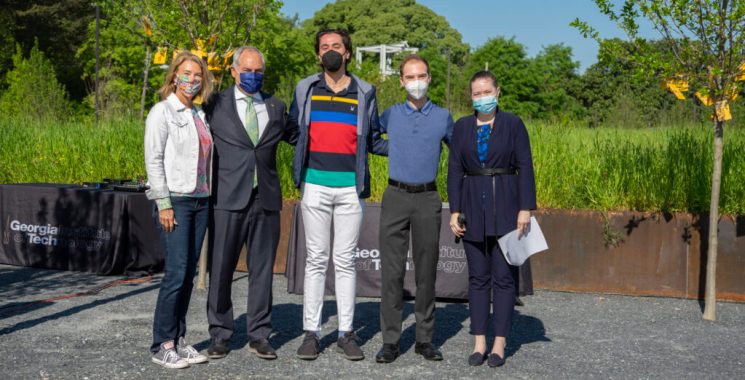
Career Alliance Aligns Recent and Soon-to-Be Graduates With Post-Graduation Success
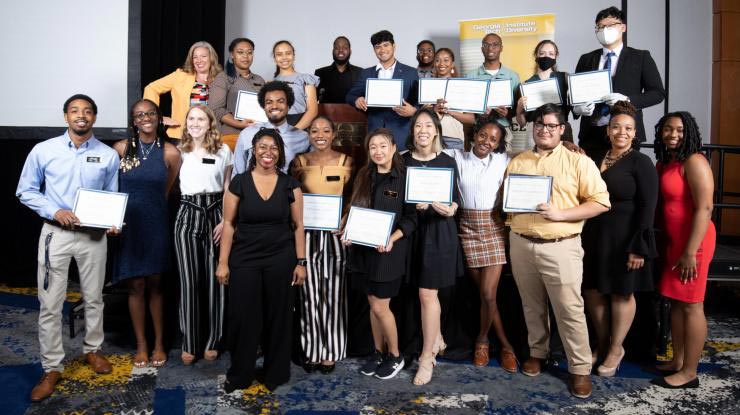
Career Alliance @ Georgia Tech provides students with focused support for success in today's competitive job market. Launched in Spring 2021, the joint initiative between OMED: Educational Services and the Georgia Tech Career Center assists traditionally underrepresented students who disproportionately have not received sustained career preparation. It also supports those who have faced historical institutional barriers that have hindered their full preparation for career success.
This effort was inspired through Georgia Tech’s participation in the Taskforce on Higher Education and Opportunity where 38 academic institutions across the nation have been collaborating to prepare the “most vulnerable college students for success and stability in the post-Covid-19 pandemic economy.” The Taskforce represents 2.5 million students at two-year and four-year public and private institutions.
The Alliance hosted an inaugural three-week Career Immersion Summer Residential Program from May 16 to June 5, 2021, where 24 student participants were welcomed for an on-campus experience full of professional development workshops, interview and branding courses, and off-campus experiential learning opportunities such as internships, co-ops, shadowing apprenticeships, and student assistantships. Participants also received one-on-one career coaching and mentoring from corporate partners to assist them with identifying ways to align their passions with their majors and desired career paths.
The initiative will continue through 2023.
By Optimizing 'Swing Space,' an ISyE Senior Design Team Impacts the Entire Institute
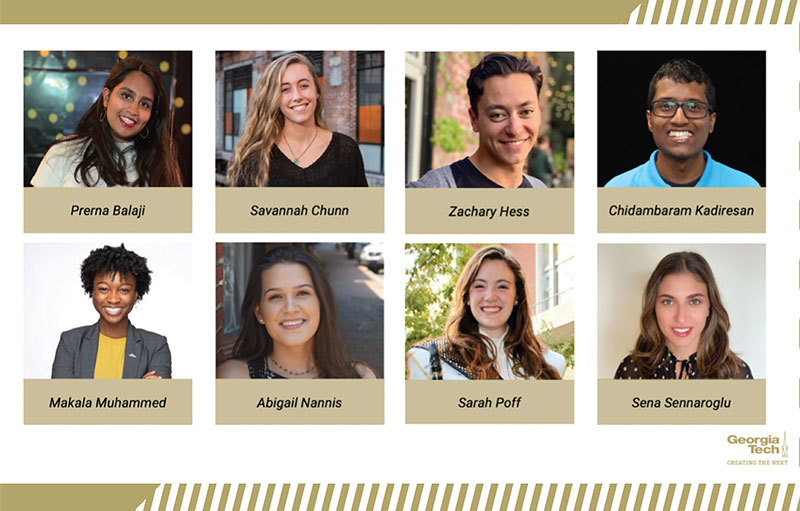
When a building undergoes renovation at Georgia Tech, what happens to the affected classes?
Georgia Tech Capital Planning and Space Management (CPSM) manages the 12,000 instructional, research, and office spaces on campus. When a building is renovated, CPSM locates “swing space” — available space that can be reallocated to accommodate displaced courses. In the past five years, 50% of renovation projects were completed in multiple phases because of swing space concerns.
An ISyE Senior Design team, “Swing Space Champs,” worked with CPSM to identify instructional classroom swing space more easily. The Howey Physics Building’s multiphase renovation inspired the team to investigate the impact of swing space allocation. Howey served as a rigorous case study for the project because of its large-capacity lecture halls, which created a challenge when trying to relocate classes.
The team developed the Swing Space Analysis Tool, which produces a solution that includes a new room for each displaced course, a remote delivery recommendation if an available room cannot be found, and reduced capacity of a course if deemed necessary. The tool can save an estimated 3-5% of the project cost for each phase that is eliminated in a renovation, resulting in significant cost savings across future renovation projects.
Industrial Design Student Aya Ayoubi Wins InVenture Prize
2021 InVenture Prize winner Aya Ayoubi used her lessons in industrial design to build a jacket that could make the world a kinder place. She calls her creation, the Delta Jacket, “Humanitarian Couture” — a concept that won the hearts of Georgia Public Broadcasting’s InVenture Prize television audience, as well as the People’s Choice Award.
“Back in Jordan, where I am from,” Ayoubi said, “we have a refugee crisis. A crisis where people are leaving their country with only the clothes on their backs. In Georgia, there may not be refugees, but there are many people affected by homelessness.” She designed the Delta Jacket to provide safety and dignity to homeless populations, making a global connection with people experiencing this heartbreaking condition.
The Delta Jacket is an inflatable, reversible, and waterproof jacket that transforms into an air mattress or a sheltering garment through a series of zips. Ayoubi said she used biomimicry as her main inspiration. “One of the biggest pain points of people who are chronically homeless is the disconnect between their nomad lifestyle and their heavy, impractically moveable bedding,” she said. “By emulating the way that penguins can puff up to retain heat, I was able to come up with the Delta Jacket to solve that issue.”
Tech Community Supports Good Samaritan Health Center
In Summer 2020, Good Samaritan Health Center, more commonly known in and around Atlanta as Good Sam, launched a Covid-19 helpline for all Good Sam patients and the community at large.
Apart from connecting patients with providers and supporting the Covid-19 testing and vaccination appointment process, helpline volunteers, which included some 40 Georgia Tech students, have taken 30,000 calls and scheduled 20,000 Covid-19 tests.
“I think it speaks volumes about the Georgia Tech student body's leadership skills and commitment to supporting and uplifting their community,” said Priyasha Pareek, a recent Georgia Tech neuroscience graduate and Good Sam volunteer. “I have always seen Georgia Tech as an innovator, and it is incredibly satisfying to see how others can benefit from the model Georgia Tech students helped establish.”

Georgia Tech Arts Moves Outdoors
After a year of limited arts performances on campus due to the pandemic, Georgia Tech Arts championed innovation, rolling out a monthlong series of outdoor performances by creating a performance venue called the Skyline Stage.
The Skyline Series included performances ranging from live music to contemporary dance and featured a mix of Georgia Tech groups, Atlanta arts companies, and internationally recognized artists from outside of Georgia.
This outdoor performance series looked and felt entirely different from pre-pandemic shows at the Ferst Center for the Arts and provided audiences opportunities to gather and enjoy live performances in a safe space that had not been possible otherwise.

Veterans Resource Center Opened
The Georgia Tech Veterans Resource Center promotes student learning and development, supporting degree completion by providing comprehensive services that enhance and complement the academic experience specifically for students who are veterans, military members, reservists, guard members, and dependents.
Serving as a central community space for veterans and military-connected students, while focusing on expanding access to programs and services and supporting their well-being, the center originally opened in September 2013 in the Smithgall Student Services building. Due to a generous donation, a renovated Veterans Resource Center opened in August 2020 and now occupies the former Quad Café space in the Ford Environmental Science & Technology Building.
The new space hosts veteran networking, tutoring, and mentoring programs, and encourages partnerships with other veterans groups, campus organizations, and federal veterans' resources — all programs that were not possible in the smaller original space.
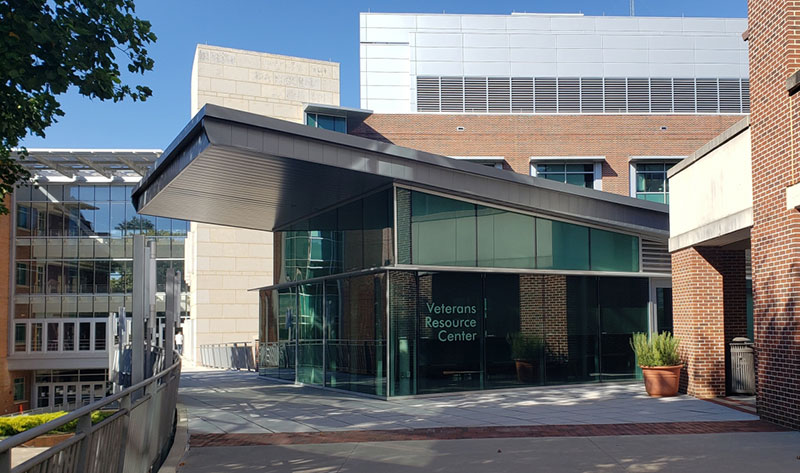
Georgia Tech Launches Thrive@GT Mental Health Initiative
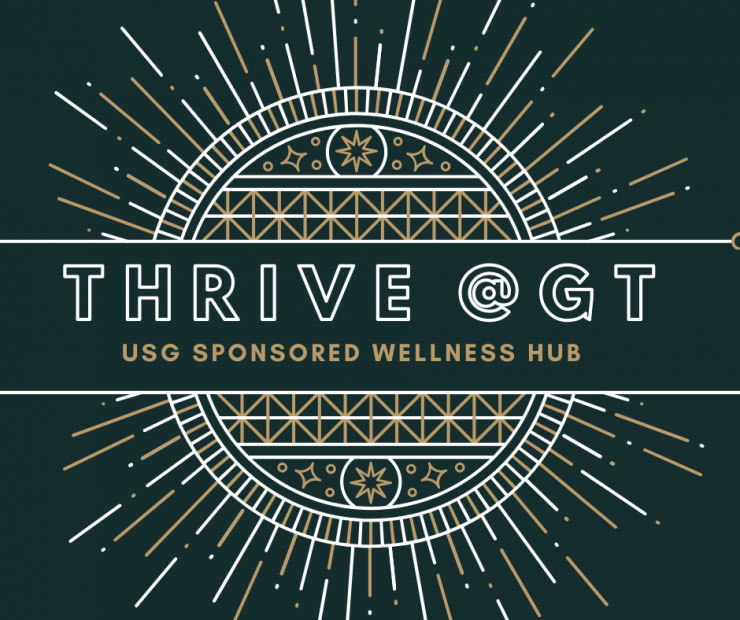
In Spring 2021, as part of efforts to expand the focus on mental health and well-being, the Institute formed a new partnership, through the University System of Georgia Mental Health Initiative with Christie Campus Health, to implement the CONNECT program. Through this program, Georgia Tech now offers students a wellness portal called Thrive@GT, with the overall goal being to ensure that students have support available to them 24/7 year-round — no matter where they are.
“Thrive@GT provides students access to additional resources, as part of the USG Mental Health Initiative, that complement the mental health and well-being services offered here at GT,” said John M. Stein, associate vice president for Student Engagement and Well-Being and Brandt-Fritz Dean of Students Chair. “My hope is that students use this valuable resource as a self-help tool to support their mental health along with all the other well-being resources on campus available to support them.”

